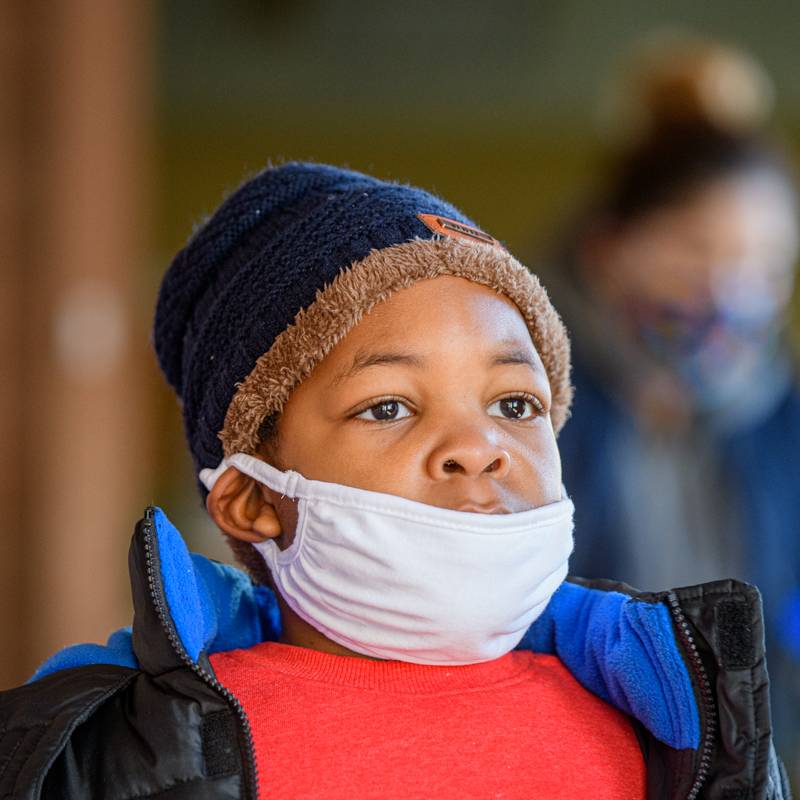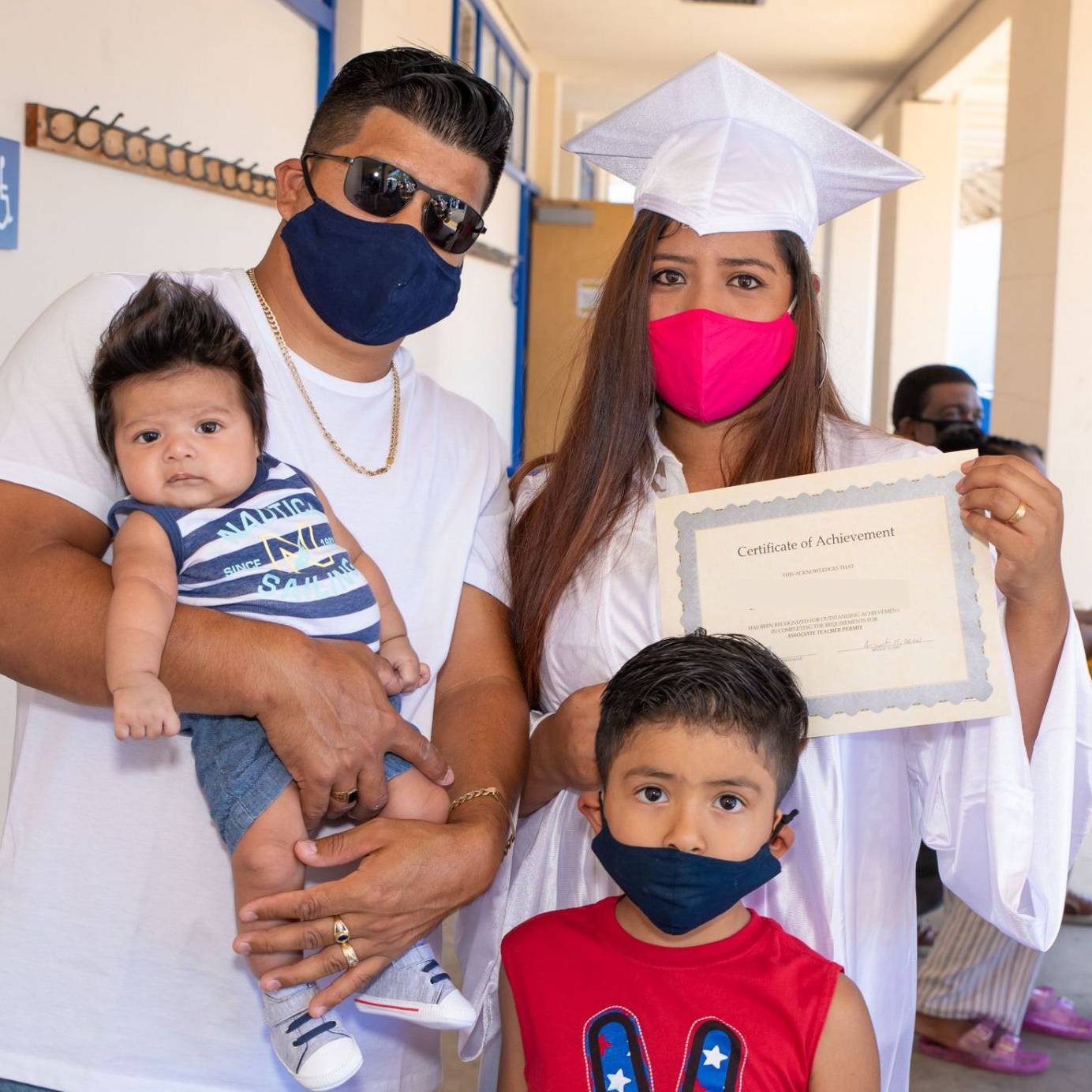Community Resilience Fund
The COVID-19 pandemic more clearly exposed the inequities and vulnerabilities of our systems and communities. With a commitment to social justice in service to child and family well-being, First 5 established a Community Resilience Fund (CRF) in April 2020, now totaling more than $10 million. Through the CRF, First 5 was able to leverage unique organizational strengths—speed and flexibility in creating grants and contracts and trusted relationships with community-based organizations—to help children, families, caregivers, and child care providers cope with the heightened challenges of the pandemic.
Our investments create a through line from our mission and vision to concrete actions supporting equity, informing partnerships and implementation.
The goals of the fund are to:
- Address the needs of young children, their families, and the early childhood system that supports them
- Apply an equity framework to prioritize investment in communities that are most vulnerable as a result of racist and classist policies and practices
- Leverage First 5 evaluation data and existing investments by supporting key kindergarten readiness recommendations, as well as augmentations to our existing Neighborhoods Ready for School grantees
INVEST 01
Community Resilience Fund:
Supporting Urgent Needs of Children & Families
Using an Equity Framework to Inform Investment
Through the Community Resilience Fund, we launched a massive relief effort built on an equity framework that prioritizes investment in people and places disproportionately impacted by the COVID-19 pandemic due to structural race and class bigotries. The Resilience Fund grants priority to African American/Black, South East Asian/Asian Pacific Islander, Latinx, Native American, and immigrant populations, undocumented families, and others experiencing poverty. Resources are being allocated to mitigate the resulting inequities.
Supporting Access to Food & Essential Supplies
The Community Resilience Fund has spanned direct financial assistance to families, essential supply procurement and distribution, and access to food. Our investment has also laid the foundation for additional funds from philanthropy and local public systems to make grants and partner with First 5 to enrich local programming.
First 5 shifted internal resources and operations to work with SupplyBank.Org and make bulk purchases and distribute essential items, such as diapers and wipes, hand sanitizer, disinfectant, thermometers, and more.
Through support for Alameda County Community Food Bank, food and supplies were distributed through WIC sites, local hospitals, school meal programs, community organizations, and Neighborhoods Ready for School sites.



5.2 Million+
essential supply
items
50+
distribution sites
714,000
meals
purchased with First 5 funds & distributed by the Alameda County Community Food Bank
Creating Economies of Scale for Partners
First 5 partnered with Eden Health District and SupplyBank.Org to procure and deliver KN95 masks and other supplies requested by ECE providers, such as cleaning materials, hand sanitizer, hand soap, paper goods, and more. Our streamlined procurement process allowed us to capitalize on economies of scale, in coordination with our county’s child care resource and referral (R&R) agencies, to purchase additional supplies.

1,476,900+
diapers

261,400
gloves

118,000+
masks

8,700+
books
3,232,700
baby wipes
1,400+
liters of hand sanitizer
48,200+
feminine hygiene products
3,300+
coloring books & crayons
Hear from Hively, An R&R Partner
"First 5's ability to mobilize resources goes far beyond what our ability would be on our own."
- Kelly O'Lague Dulka, CEO, Hively
INVEST 02
Community Resilience Fund:
Bolstering Public
School Districts
2019 Kindergarten Readiness Assessment (KRA)
First 5 has led research on kindergarten readiness in Alameda County since 2008. Over time, the percent of children ready for school has remained stubbornly low, with only 44% of children assessed showing up fully ready. Persistent disparities are seen by race, income, and gender. The data has also sharpened focus on social conditions that shape and impact children’s physical, social-emotional, and cognitive development, pointing to the need for local systems change in support of families and caregivers, including investments in a secure safety net, stable housing, neighborhood assets, and workforce development.
For the first time in 2019, we used the Kindergarten Readiness Assessment (KRA) to explore the readiness of communities and schools to support children and families’ successful entry into kindergarten. The findings reinforced the importance of investing early in children, as well as in their families and communities. One major finding was the importance of kindergarten transition activities in elementary schools to support student and family success.
In a time of crisis for families and our educational partners, we put this data to use to inform and maximize our Community Resilience Fund investments. Grants to school districts supported kindergarten transitions and were also flexible so that school districts could allocate resources based on families’ need for food, school supplies, laptops, school staffing, distance learning support, and more.



Children had better outcomes
in social & emotional development/competencies
that participated in a Kinder Transition Teacher Leader (KTTL) Program compared to children from non-KTTL sites
"First 5 has not only provided unparalleled advocacy for pre-kindergarteners for over 20 years, the organization responded quickly during the COVID-19 pandemic. They invested in school districts to help incoming kindergarteners and their families to meet their most basic needs. What sets First 5 apart is its large platform. They have the opportunity to make real change in Alameda County."
– Curtiss Sarikey, Chief of Staff, Oakland United School District
INVEST 03
Community Resilience Fund:
Stabilizing the Child Care Field
Rapid Response for the Child Care Field
Child care is the workforce behind the workforce. It plays a vital role in keeping our economy and society running. In this moment of national crisis—with child care providers strained by limits on enrollment and group size, coupled with increased costs to meet heightened health and safety requirements—we initiated a rapid response to stabilize the field through grants, distribution of supplies, and support for technology needs.
We provided financial assistance to family child care (FCC) providers by partnering with Silicon Valley Community Foundation and the Low-Income Investment Fund (LIIF). First 5’s partnerships helped to secure grants and technical business assistance for FCC providers who have been severely impacted by the pandemic.
Family Child Care Hit Hard by COVID-19 Pandemic
The COVID-19 pandemic's impact on family child care (FCC) has strained the finances of families and businesses alike. The Center for American Progress estimates that in California during the COVID-19 pandemic, there was a:

75%
increase in the average cost to operate a home-based FCC

compared to

54%
increase in the average cost to operate center-based care

1 out of 4
family child care homes
reported that they are closed (Resource & Referral Agency, as of September 2020)

Nearly 40%
of child care centers
reported that they are closed for onsite care as of September 2020
Securing Funds & Supplies for FCC Providers
First 5 partnered with the Low Income Investment Fund (LIIF) and Silicon Valley Community Foundation to secure grants and technical assistance for FCC providers, ensuring Alameda County's representation among other Bay Area counties and laying the groundwork for other philanthropic contributions.
The seed funding with LIIF also facilitated a $3 million investment in FCC grants from Alameda County Social Services Agency administered by First 5.
$3 Million
in family child care grants
provided by Alameda County Social Services Agency from CARES Act funds

$1 Million
additional funding
for supplies such as air purifiers, gloves, and masks
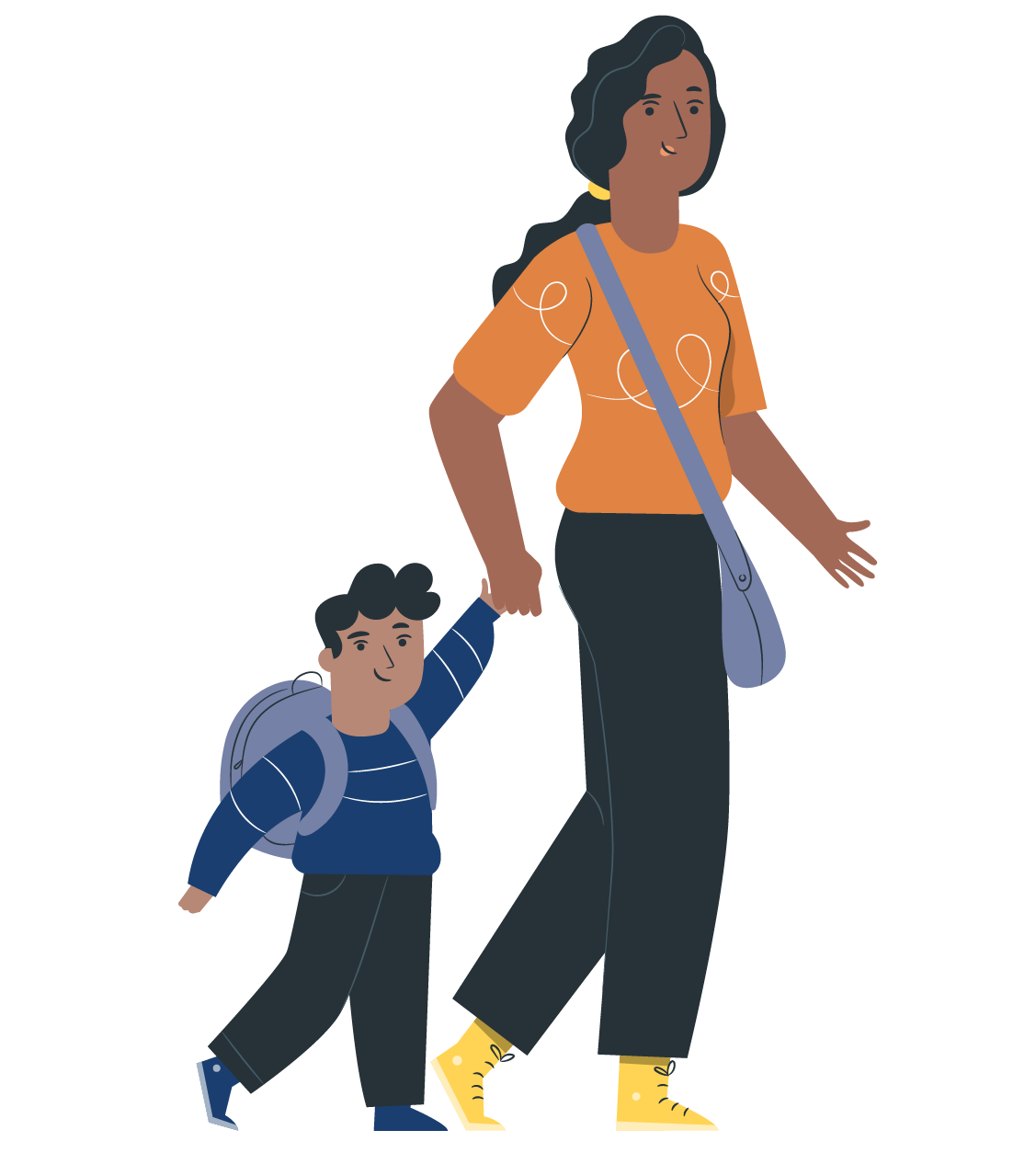
500+
child care providers
were provided supplies, serving over 2,500 children
Addressing Technology Needs of Child Care Providers
In recognition of the importance of technology and connectivity during the COVID-19 pandemic and to lay the groundwork for implementation of Measure C: Children's Health and Child Care Initiative, we also invested in the purchase of laptops to distribute to FCC providers and caregivers.
This investment has supported greater access to online resources, such as professional development, coaching, and virtual storytimes. We are also providing ongoing technical assistance and capacity building to promote business and programmatic best practices in the child care field.
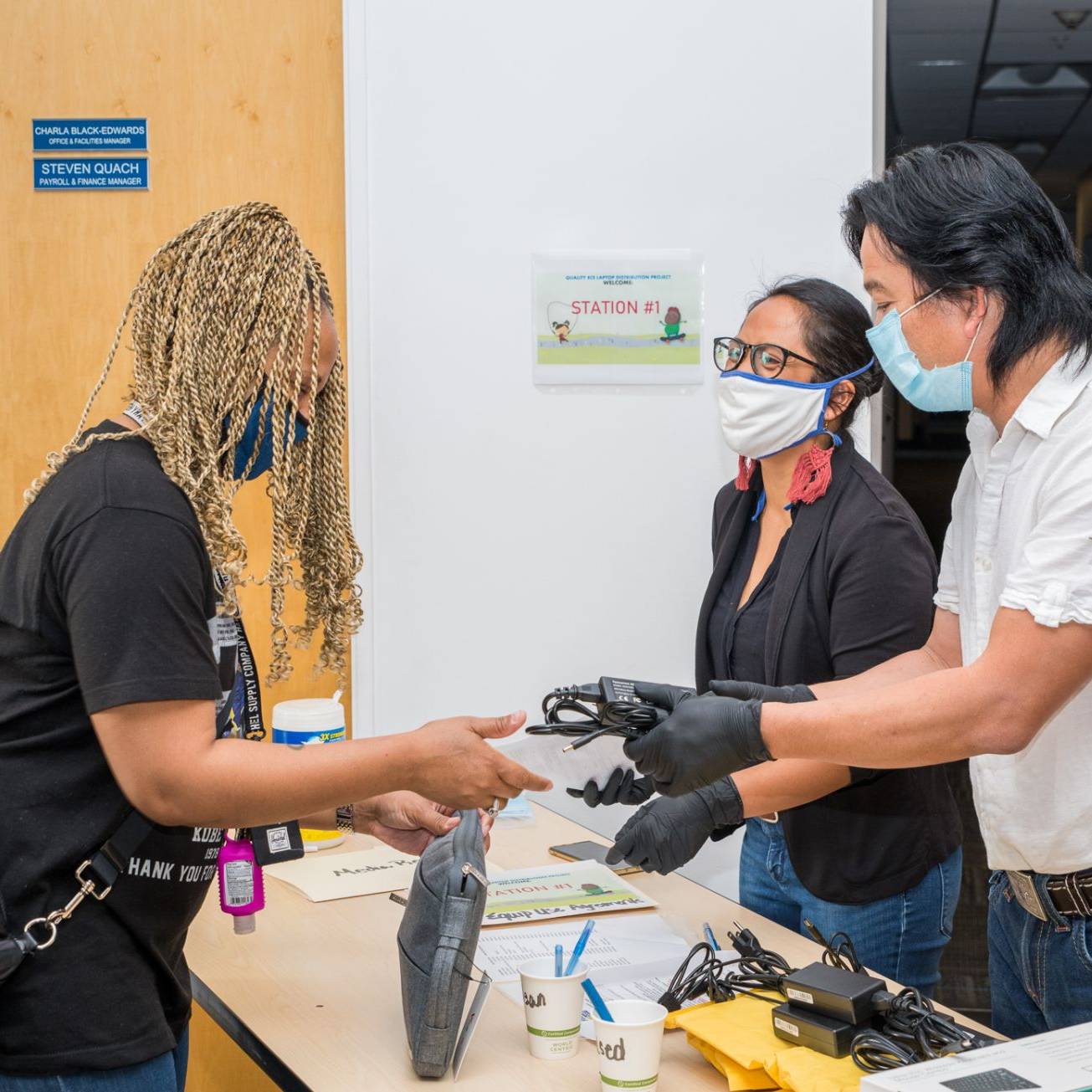
150 laptops
distributed to family child care providers
Hear from Providers at the Laptop Giveaway Event
"We're currently not only running our child cares and taking care of the children, we're also assisting the public school districts in teaching the children their educational curriculum through Zoom."
- Katina, Child Care Provider
INVEST 04
COVID-19 Pandemic:
Contributing to Alameda County's Emergency Child Care Response
Countywide Emergency Child Care Response
As part of the Alameda County Child Care Emergency Response Team, First 5 worked closely with county agencies, including Public Health, Social Services, and General Services, to assess the ongoing needs of child care providers. We supported data collection and analysis to help inform development and implementation of plans to support child care providers, families, and children.
Data Collection & Surveying
Our rapid support for data collection and surveying early in the COVID-19 pandemic captured needed information about:
- Child care providers regarding their capacity to deliver emergency child care and assessing need among essential workers
- Cities regarding their efforts and interest related to emergency child care
- Contractors and community partners to develop estimated quantities of emergency supplies, from diapers to hand sanitizer
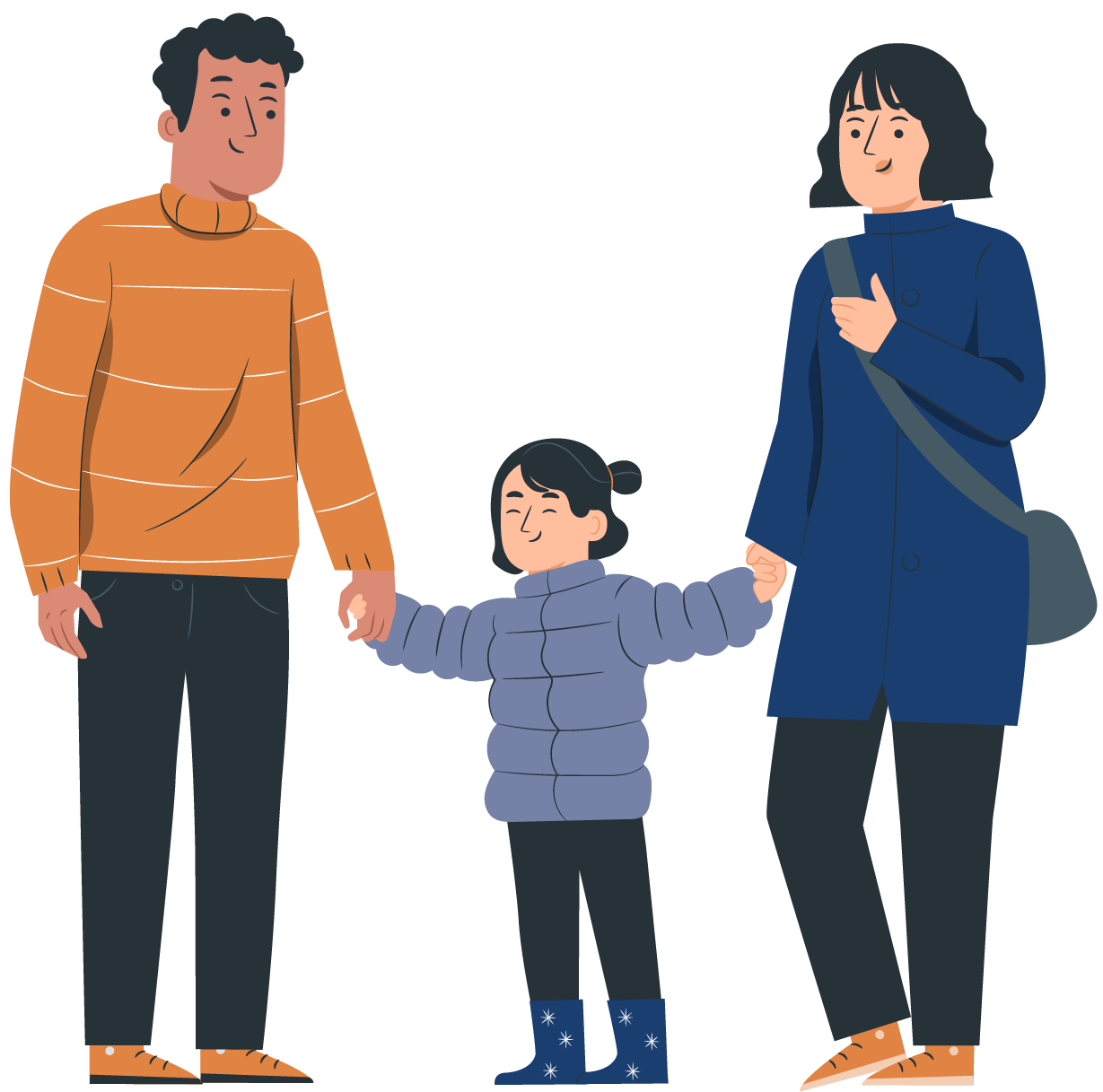
1,810
families
filled out a centralized intake form,
requesting care for 2,620 children
730
of these families
work in health care
Health Heroes with Samuel Merritt University
As part of the county's Emergency Response Team, First 5 helped forge a partnership with Samuel Merrit University (SMU) College of Nursing to offer health and safety supports to open and planned re-opening child care providers. Under the supervision of a Registered Nurse faculty member, SMU student nurses support child care providers and staff with current best practices regarding: infection control, US Centers for Disease Control and Alameda County Public Health guidelines, social distancing, and health practices.

110
child care sites
have participated in Health Heroes for Child Care

Nearly 300
student nurses
have participated in Health Heroes for Child Care
"This program is a great way to empower centers with hands-on knowledge [so] that their facilities are healthy, safe spaces for children and staff."
- Heather Leyva, King's Kids Preschool & Child Care Director
Child Care Provider Webinars
We began co-hosting webinars in partnership with the Alameda County Emergency Child Care Response Team to provide timely updates to child care providers, based on incoming requests for information on topics such as public health, safety, small business loans, and unemployment insurance.

7 webinars
to support child care providers during
the COVID-19 pandemic
700+
child care providers
participated in the webinars
Check Out a Past Webinar for Child Care Providers
Early Care & Education
COVID-19 Webinar
April 1, 2020
With Louis Girling, Jr., MD, FAAP
and Lisa Erickson
INVEST 05
Directing Resources to Underserved People
Maximizing Investment Through Partnerships
In service to our commitment to racial, economic, and social justice, we made targeted investments in communities disproportionately affected by the COVID-19 pandemic. Our partnership with the California Wellness Foundation allowed us to double our impact for community organizations that are also Wellness Foundation grantees, including Parent Voices Oakland, Lao Family Community Development, and Unity Council. Funds were provided flexibly to meet the greatest need.
- Purchase essential supplies including but not limited to: personal protective equipment, cleaning supplies, gift cards, and child development/educational materials.
- Provide grocery gift cards and diapers for families who have positive diagnoses of COVID-19 or who have lost employment or faced eviction due to the COVID-19 pandemic.
- Employ multiple digital organizing strategies including but not limited to: digital townhalls, “Thunderclap” and “Twitter Storm” advocacy events, testimony at city, county, or school board hearings about policy priorities, and digital storytelling.
Stipends to Family-Serving Shelters
We also provided stipends, in large part due to the partnership and generosity of Sunlight Giving, to all shelters serving children and families experiencing homelessness or domestic violence.

All 10
homeless & domestic violence shelters serving families

400
total families
received stipends
“I appreciate First 5 reaching out to partner in support of children and families who have been among the hardest hit by the pandemic, including investing in parent leadership for equitable systems change. I’m proud of our work together to ensure that families and communities disproportionally impacted receive focused resources to support their wellness.”
- Pamela Simms-Mackey, California Wellness Foundation

